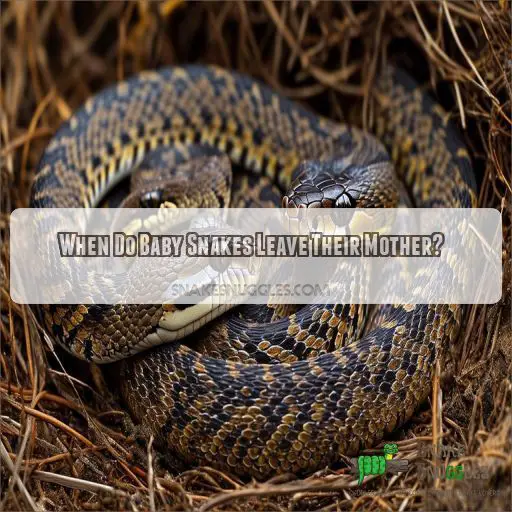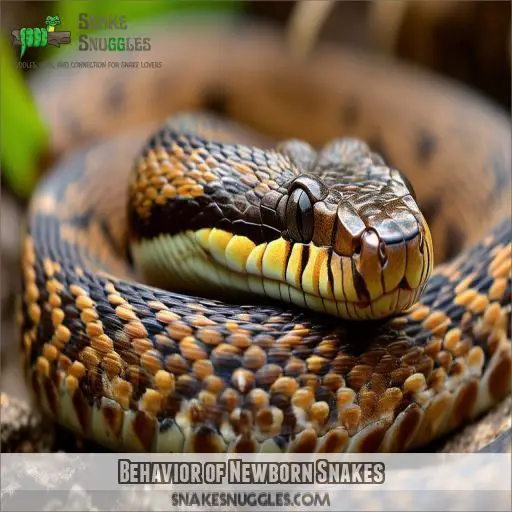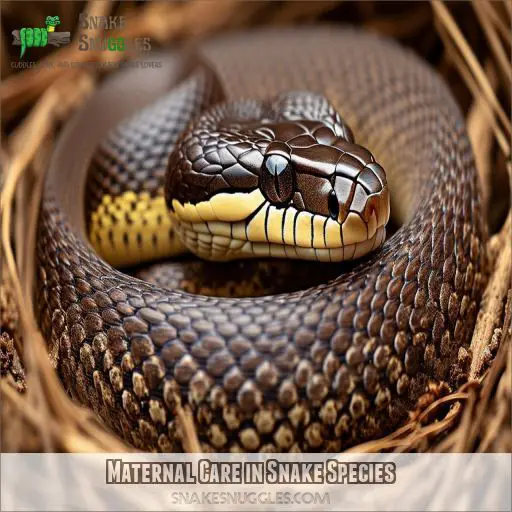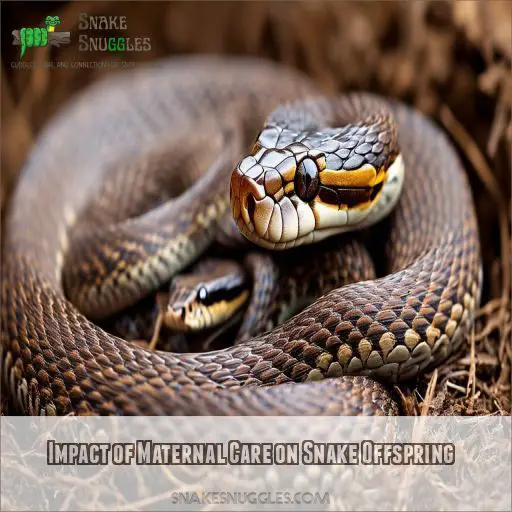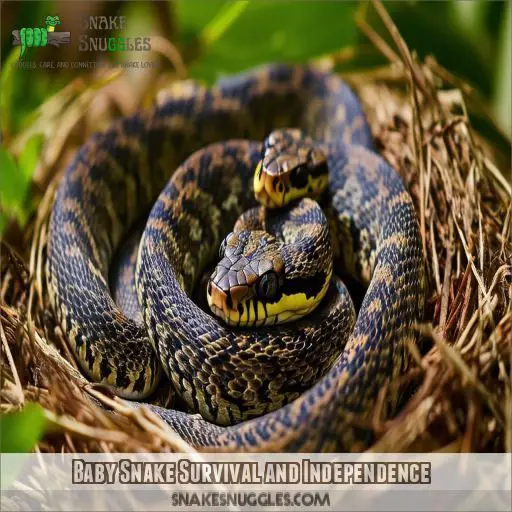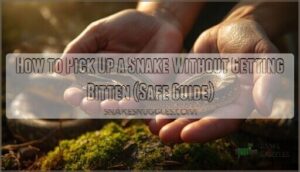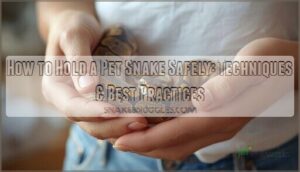This site is supported by our readers. We may earn a commission, at no cost to you, if you purchase through links.
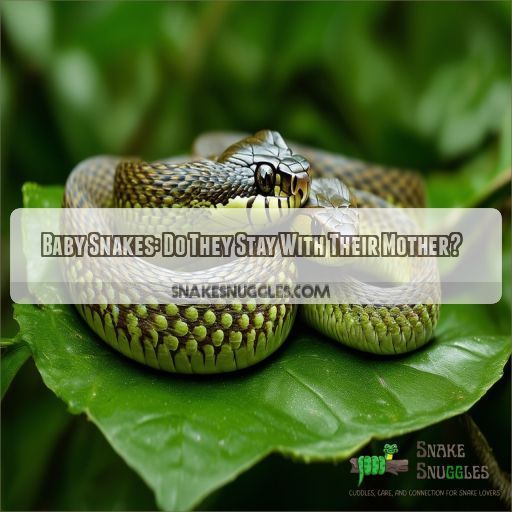
In the snake world, it is common for newborns to be independent right after birth.
They typically do not stick around with their mother and live solitary lives.
But, as with most rules, there is an exception, and rattlesnakes represent a unique case.
Table Of Contents
- Key Takeaways
- Do Baby Snakes Stay Mother?
- When Do Baby Snakes Leave Their Mother?
- Behavior of Newborn Snakes
- Maternal Care in Snake Species
- Impact of Maternal Care on Snake Offspring
- Baby Snake Survival and Independence
- Frequently Asked Questions (FAQs)
- How soon do baby snakes leave their mother?
- What to do if you find a baby snake in your yard?
- Do female snakes stay with their babies?
- Do snakes stay together as a family?
- Do baby snakes stay with their mother?
- How long do baby snakes remain with their mother?
- Do baby snakes receive maternal care?
- How does maternal care affect baby snakes?
- How long can baby snakes survive without their mother?
- Conclusion
Key Takeaways
Baby snakes are like solitary wolves, venturing into the wild alone soon after birth.
Most snake mothers part ways with their offspring immediately, never to see them again. They don’t linger to tuck their babies in at night.
An exception is the rattlesnake, which hovers like a helicopter parent over its young for up to a week.
Baby snakes are resilient and independent. They enter the world equipped with the skills necessary for survival and self-protection, even without maternal assistance.
Do Baby Snakes Stay Mother?
Baby snakes don’t stay with their mother for long. They are born independent and ready to fend for themselves, leaving their mother soon after birth.
Despite this, newborn snakes demonstrate an ability to navigate their habitat and employ strategies to avoid becoming prey.
Continue for a deeper exploration into the realm of newborn snake behavior.
When Do Baby Snakes Leave Their Mother?
Baby snakes typically leave their mother soon after birth. They are born independent and do not require maternal protection.
Some species, like rattlesnakes, are an exception. They stay with their mother for up to a week.
Generally, snake mothers abandon their eggs or newborn snakes. From birth, these baby snakes are left to fend for themselves. They capture their own food, such as insects, amphibians, and rodents. They also navigate their habitat without any maternal guidance.
Behavior of Newborn Snakes
Now that we’ve covered when baby snakes typically leave their mother, let’s shift our focus to understanding the behavior of these newborn snakes.
Snake babies, like many other reptiles, are often independent from birth. They may initially stay close to their mother, but this is usually short-lived. These little snakes are quick to adapt to their surroundings and begin their journey alone.
One of the first challenges they face is finding food. Baby snakes are skilled hunters, capturing their own prey, which typically includes insects, amphibians, and small rodents. This diet provides them with the necessary nutrients for growth and survival.
In terms of habitat selection, baby snakes often choose environments similar to their mother’s. They seek out places that offer both protection from predators and easy access to food sources. This could be in tall grass, under rocks or logs, or even in abandoned burrows.
While they may be small, baby snakes aren’t defenseless. They employ various strategies to avoid predation, such as camouflage, speed, and, in some cases, venom. Their survival instincts kick in early, and they learn to navigate their world with caution and agility.
As for social interactions, baby snakes are typically solitary creatures. They don’t form strong social bonds with their siblings or other snakes, instead focusing on their own survival and independence.
Maternal Care in Snake Species
While many snake species abandon their eggs or newborns, maternal care has been observed in rattlesnakes. After giving birth, mother rattlesnakes will stay with their offspring for up to a week, a rare occurrence in the snake world. The reasons for this behavior aren’t yet fully understood, but it provides an intriguing insight into snake evolution and behavior.
Maternal care in snakes is an important area of study for understanding snake ecology and conservation. It also has implications for snake safety and human interactions, as these encounters can influence snake behavior and habitat selection.
Impact of Maternal Care on Snake Offspring
While it’s uncommon for snake mothers to provide maternal care, the impact of this care on their offspring is significant. Offspring survival rates increase with maternal care, as mothers can protect their young from predators and provide guidance in hunting and traversing their environment.
The duration of the mother-offspring bond varies among snake species. Some snake mothers may only stay with their young for a few days or weeks, while others may remain together for several months. This bonding period influences the developmental impact on the baby snakes. Those with longer bonding durations may have improved survival skills and a greater understanding of their surroundings, increasing their chances of long-term survival.
Maternal care in snakes also has ecological implications. By influencing the survival and behavior of snake offspring, maternal care can impact the overall snake population and their interactions with other species in the ecosystem.
Baby Snake Survival and Independence
Baby snakes are independent right from birth and can capture their own food. They feed on insects, amphibians, and rodents, and reach sexual maturity in 2 to 3 years. Although they may stay near their mother initially, they aren’t dependent on their mother for protection or food.
Baby snakes are left to fend for themselves, and their survival depends on their ability to adapt to their environment and find food. They’ve to be cautious of predators and learn to identify safe spaces to hide and rest.
The independence of baby snakes is a fascinating aspect of their survival strategy, and it’s a reminder that even these small creatures are equipped with the necessary skills to navigate the world on their own.
Frequently Asked Questions (FAQs)
How soon do baby snakes leave their mother?
Baby snakes typically leave their mother within a few days to a few weeks of birth. Some species may stay with their mother for several months, and in rare cases, up to a year.
What to do if you find a baby snake in your yard?
If you find a baby snake in your yard, don’t panic! Keep your distance and try to identify the species by looking at its markings, head shape, and size. Then, carefully guide the snake into a container and secure it with a lid. If you’re unsure what to do next, contact animal control for assistance.
Do female snakes stay with their babies?
No, female snakes don’t stay with their babies. They may rest for a few hours after giving birth, but then they abandon their young. Some snakes, like copperheads, stay near their young for a couple of weeks, but this is uncommon.
Do snakes stay together as a family?
Snakes don’t stick around to raise their young. They abandon their eggs or newborns, which are capable of hunting and capturing prey on their own. So, no, snakes don’t stay together as a family.
Do baby snakes stay with their mother?
Baby snakes don’t typically stay with their mother for long. They’re independent from birth, and mothers don’t provide any parental care beyond a brief period after birth.
How long do baby snakes remain with their mother?
Baby snakes typically stay with their mother for a few days to a few weeks before becoming independent. However, some species may stay with their mother for several months or even up to a year.
Do baby snakes receive maternal care?
Baby snakes typically don’t receive maternal care. Most snakes abandon their eggs or live young, and some species, like ball pythons, are exceptions, incubating their eggs until they hatch.
How does maternal care affect baby snakes?
While maternal care in snakes doesn’t involve nursing, it does exist. Baby rattlesnakes, for instance, stay with their mothers for up to a week, benefiting from her protection and guidance.
How long can baby snakes survive without their mother?
Baby snakes can survive independently right away. However, less than 10% of hatchling northern pine snakes survive to breeding age without maternal protection. Some snakes, like vipers and African rock pythons, stay with their mothers for about two weeks.
Conclusion
Baby snakes are like tiny, scaly loners. They quickly leave their mother after birth to live independent, solitary lives.
This is the norm across most snake species. Rattlesnakes are a notable exception.
While some newborns may receive temporary maternal care, it is rare to see baby snakes staying with their mother.

